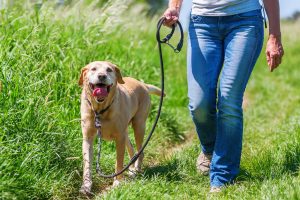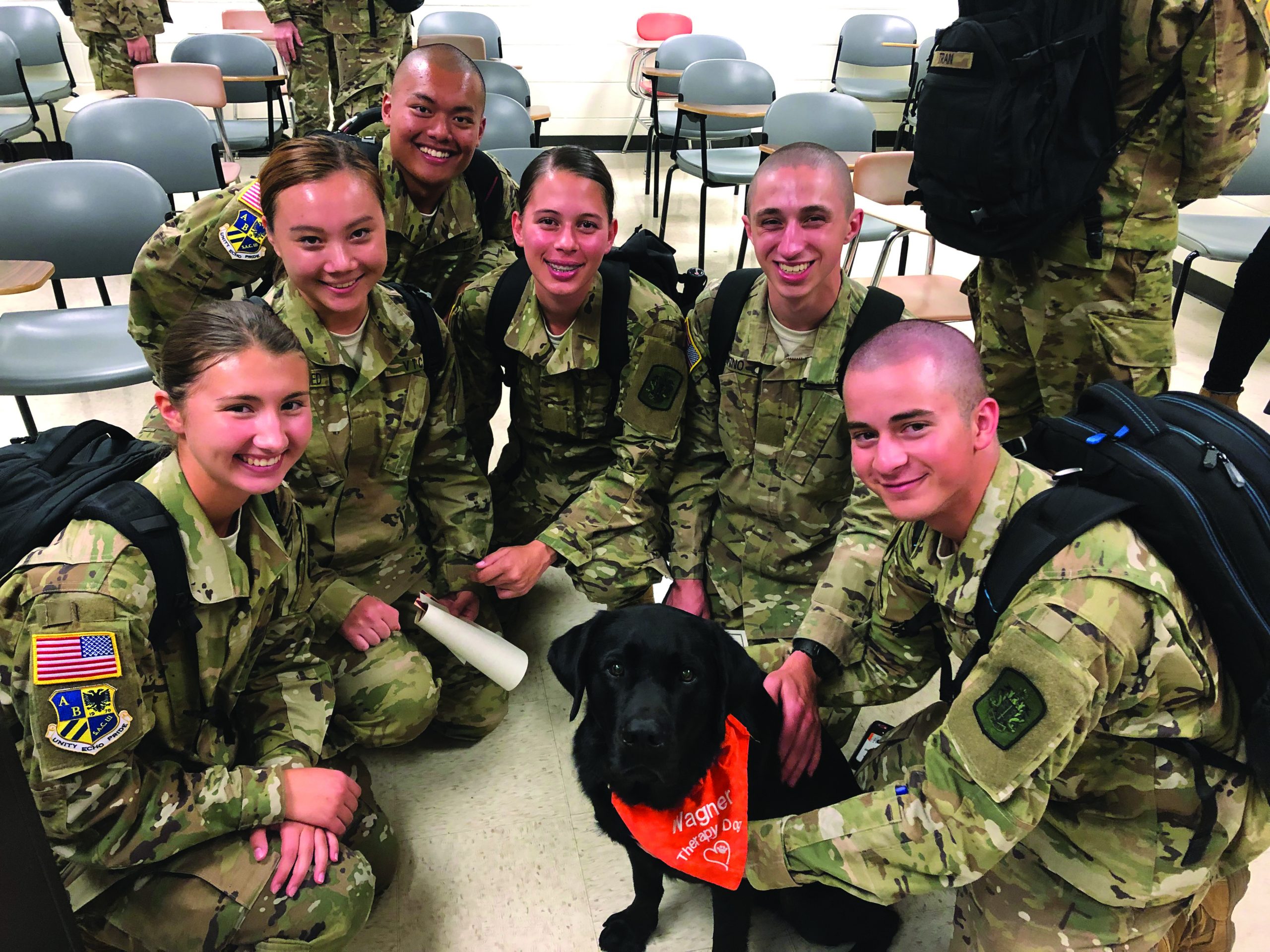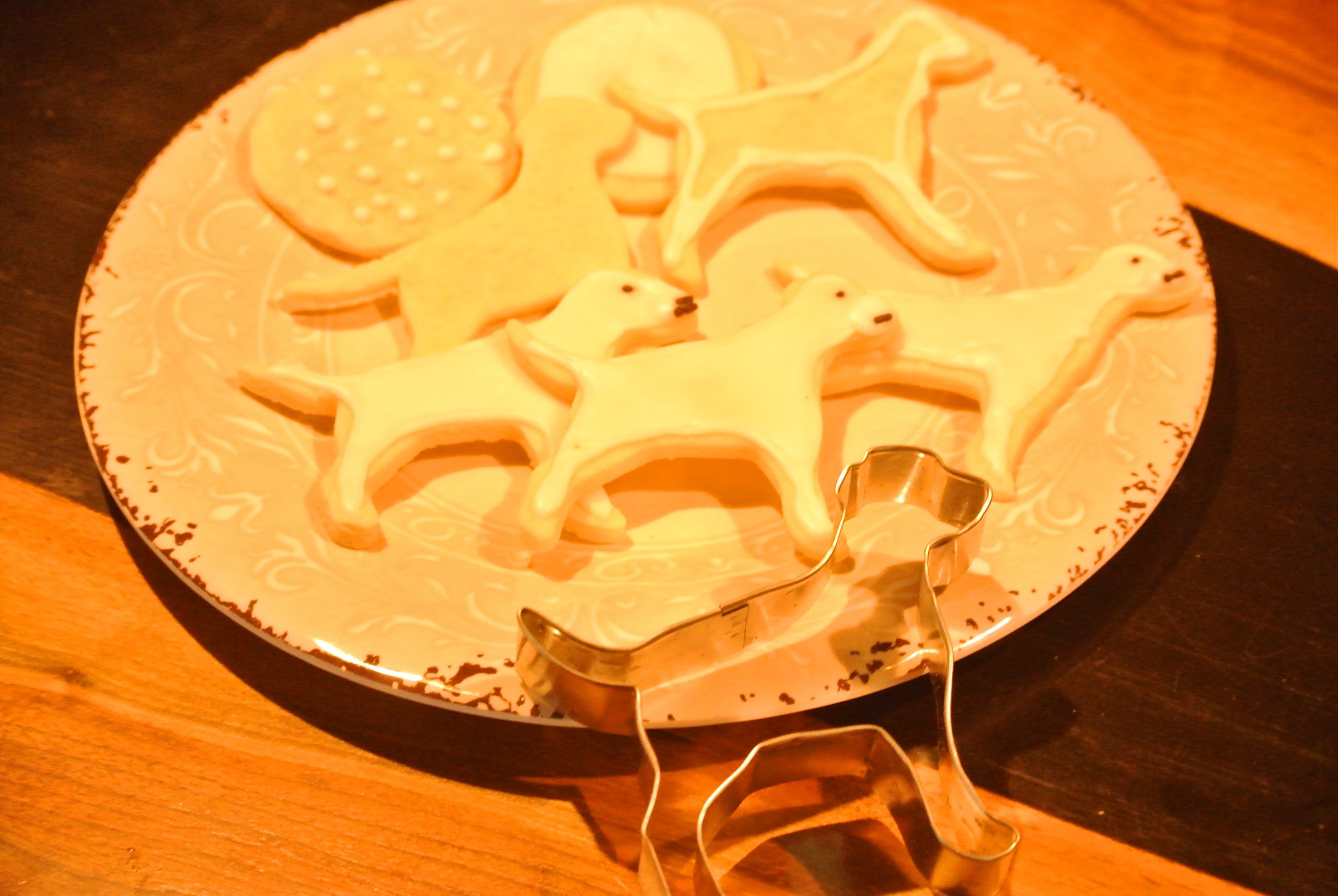by Steve Smith
If we’ve heard it once, we’ve heard it a zillion times: Dogs respect a leader of the pack; you have to become – wait for it – the Alpha.
According to what we have been told, compliments of their wolf ancestry, dogs have a hierarchy based on whose backside gets kissed and whose gets kicked. You know, top dog, leader of the pack and all that. Well, maybe, maybe not.
According to a book by Jennifer Arnold, titled Through the Eyes of a Dog, studies have shown that a wolf pack, which supposedly invented the entire enterprise, is essentially a family group: a mated pair, a few juveniles from earlier breedings hanging around like twenty-somethings that can’t find work, and this year’s crop of pups. The Mom and Pop wolves are kind to their offspring, take care of them, and violence among them is virtually unknown.
One example the author gave was from the results of a study of a wolf pack in the wild. The male wolf caught and killed four hares, which he brought back to the den area one at a time as he acquired them. They went to his mate, the newest pups, the juveniles, and finally, the last one for himself. Sounds pretty much like what you’d do, doesn’t it? The social structure of a wolf pack such as this so closely paralleled that of early humans, it doesn’t take much imagination to see wolves saying to themselves, “Huh!” and moving to the other side of the campfire; it must have been like coming home.
All of this would be fine and dandy and wolves are nice and a wolf and by extension a dog – in our case, a Lab – doesn’t become a leader and maintain the position because it possesses a “nature red in tooth and claw,” as Jack London wrote. He does it because he’s the oldest and, at bottom, a nice guy. Except that’s not how it is once a wolf or a dog finds itself not in its own immediate family but instead in a group of other, non-related dogs or wolves. Put four large, intact male dogs of almost any breed, strangers to one another, together and you’re unlikely to see anyone bringing anyone else rabbits for dinner. Somebody’s going to want to be the top dog. They’ll get it settled, and it won’t be by drawing straws.
So, what happens when a dog steps outside it’s immediate Canid family, not into a world of other dogs, but into a human family? Now, the wolf/cum Lab is in a strange environment. He’s not among family, at least not yet. And there is no parent dog, a ready-made Alpha. So, our newcomer is left to his own devices. As he grows, he finds that some members of his new human pack are more pliable and forgiving than others. He can stand at a kitchen counter, and while the lady of the house will push him down, in an instant he’s back up again, looking for anything edible within reach, as if she were not even there. If the kids are having a snack watching TV after school, he sits and begs, adds a little drool for effect, and ultimately reaches out with a paw and pokes one of them so they’ll share. And they do. On the leash going for a walk, the kids or Mom go where he wants to go at the speed he decides they’ll move. He’s calling the shots.
Then there’s Dad. Oh, yeah – Dad. Don’t countersurf when he’s within reach. You won’t get pushed down; you’ll get your knuckles rapped with a spatula, and I mean right now. Poke the kids while he’s watching? Only if you want to get dragged by your scruff and deposited into your crate and have the door slammed in your face. The leash? Forget about it. You pull on that thing, and you’ll get a smart pop right back, and then you stand there until you figure out you’re going nowhere until you’re ready to go where Dad wants to go at the speed chosen by him; and if you’re smart, you’ll leave some slack in the lead – and stay close and next to him. Better safe than sorry. The dog knows who’s in charge here, and it isn’t him. There is an Alpha after all – it’s Dad.
Which in many homes can lead to the following lament: “I feed him and take him for walks and pet him and kiss him good-night, but when I try to get him to mind me, he ignores me. You don’t pay as much attention, make him get off the furniture, and scold him when he’s bad, and he does whatever you want – why?” The question is the answer.
As much as we would love to believe it, and as smart as they are, you cannot with any degree of success reason with a dog. It is said – guessed? – that a dog has the deductive powers of a two-year-old child. Anyone who has spent any time around a two-year-old knows that reasoning with them is a daunting task. The kid’s walking toward the street. Do you walk alongside him and explain the dangers of traffic, or do you pick him up and take him elsewhere? Of course.
Dogs can pick up on our cues better than we can theirs. We have language, after all; they have to settle for a few dozen words…and body language. Boy, can they read body language. And dogs like to know the players.
Here’s what I mean by that. Have you seen the TV shows where the dog trainers go into a home where the family mutt’s an absolute outlaw? He listens to no one and rules the roost. The trainer shows up, gives a few firm commands, and the dog falls in line, gentle as a fawn, obedient as a PFC. Why? The show’s producers would have us believe that it’s because of the bearing and authority of the trainer, and that is absolutely true – but it’s not the whole story. The other part is this: The dog doesn’t know this guy, doesn’t know what he can get away with and what he can’t, so he takes the safe course of action: He obeys until he figures out the landscape; and in 23 minutes plus commercials, there isn’t time. Again, better safe than sorry.
In other words, dogs evaluate us, make up their mind about each of us, and treat us accordingly. My non-PC example above is true in many homes: Mom and the kids are pushovers, Dad is the pack leader – the Alpha. He is to be respected and obeyed because failure to do it can be downright uncomfortable. And – sadly – once a dog’s mind is made up, it’s difficult to change. It’s a tough road to go from being a patsy to one calling the shots, but there are ways.
First comes food, and the pecking order in the house can be established right from the get-go. Mother wolf comes back from a hunt, her stomach carrying partially digested meat. The pups see her coming, mob her, and lick her mouth, a signal for her to disgorge breakfast (ugh). It has been said, rightfully, I believe, that dogs are wolf pups that never become wolf adults because they are dependent upon someone else for their food. (At my house, my two dogs, when suppertime is nigh, find my wife, who does most of the feeding, and try to lick her face. Nothing like a big old sloppy canine kiss to signal that it’s chowtime.)
So what can you do to take advantage of that and to establish that you are calling the shots? Spit on the dog’s food before you put it down for him to feed. Yeah, I know…but it works. If you are the source of food, and its taste is tied to you, you are in charge.
Something else: In canine society, the leader of the pack can walk where he wants, and the subordinate members move out of the way. Likewise, when he flops down, he stays put – the others walk around him. Do you have to step over your Lab because he’s lying where you want to walk and he isn’t moving? Realize that he’s saying to you, I was here first – you don’t like it? Tough. Make him move. A nudge or two in the ribs will do it.
 Going for a walk? On goes the leash, the door opens…but who goes out first? It should be you. The Alpha goes first, the subordinate waits his turn.
Going for a walk? On goes the leash, the door opens…but who goes out first? It should be you. The Alpha goes first, the subordinate waits his turn.
Does you dog sleep on your bed with you? If so, that’s fine, and he no doubt gives you a feeling of security as he also keeps your feet warm. But realize that when he enters this, your most private inner sanctum, he is assuming a place as your equal. And sometimes there’s a downside.
A dog that has the run of the house, has established himself or herself as the Alpha, can be just as sweet and loving as one less dominant. But there will come a time when the dog digs in his heels, doesn’t mind, persists in behavior you’d just as soon not have and that you don’t seem to be able to correct – mobbing visitors even though you’re shouting at him, the most printable of your exhortations being, “Down! No!” He is telling you that he’s doing things his way because he’s in charge, not you. Losing control and position is easy; regaining it takes work.
You have a lot of things on your mind, but your dog doesn’t. He is constantly reading you, watching how you react and, in some cases, looking for ways to elevate his standing and trivialize yours. And don’t kid yourself: Male or female, young or old, they all are doing it.






